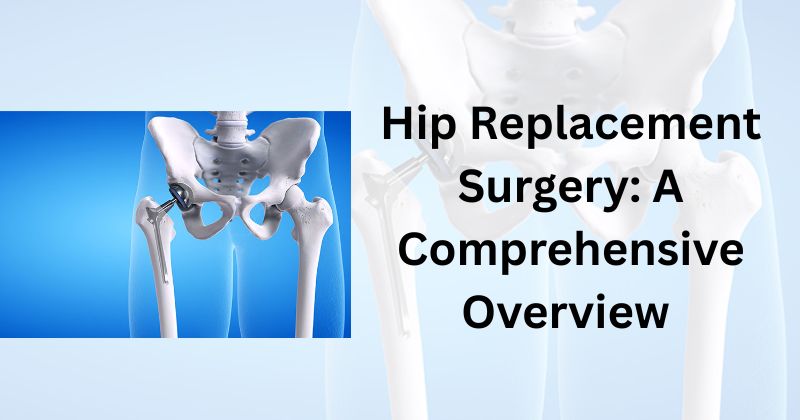Hip pain can affect every part of life, from walking, sleeping, to enjoying your favorite activities. Hip replacement becomes a powerful option when treatments like medication & physiotherapy don't work. But a common question is: how long does it take to recover from hip surgery, hip replacement? In this blog, we'll explain everything from what happens in surgery to recovery times & how advanced robotic methods are changing the game.
What Exactly Is Done in Hip Replacement Surgery?
Hip replacement surgery is performed when the hip joint is badly damaged & causes a lot of pain. Doctors remove the damaged parts of the hip joint & replace them with artificial components called prosthetics. These new parts are usually made of metal, ceramic, or strong plastic. The new joint helps the patient walk without pain & helps the hip regain normal function.
Is This Surgery Meant for You?
Not everyone with hip pain needs surgery. But surgery may be needed if:
- The pain keeps you awake at night.
- You have trouble getting in & out of a chair or bed.
- You can't walk properly without help.
- Your daily life is affected.
- Other treatments have failed.
Your doctor will examine your X-rays, physical health, & pain level before suggesting surgery.
Robotic Hip Replacement: A Modern Option
In recent years, robotic hip replacement surgery has become a preferred method in many hospitals. This technology allows surgeons to plan & perform operations with extreme precision using robotic equipment.
Benefits of Robotic-Assisted Hip Surgery:
- Smaller cuts & less tissue damage
- Lower chances of complications
- Better fit & placement of the artificial joint
- Faster recovery & less pain
- Long-term durability of the implant
- Not all hospitals offer this technology, but if available, robotic surgery can be an excellent option for suitable candidates.
How is the surgery performed?
The procedure begins with anesthesia — either general (you're asleep) or spinal (you're awake but have no pain from the waist down). The surgeon:
- Makes a small incision near the hip
- Removes worn bone & cartilage
- Inserts artificial joint parts
- Makes sure everything fits correctly & moves smoothly
- Closes the incision & bandages the area
The operation usually takes 1 to 2 hours, depending on the method used.
Understanding the Recovery Process
Let’s talk about what most patients want to know: how long does it take to recover from hip surgery, hip replacement?
Recovery Timeline at a Glance:
First Week: You will start walking slowly with the help of a walker or crutches.
Weeks 2 to 4: Movement improves. You may be able to go to the bathroom or walk short distances by yourself.
By Week 6, Many people return to work (desk jobs) or drive again.
3 Months: Most everyday activities feel normal.
6 to 12 Months: Full recovery. The joint feels strong & stable.
Recovery time can vary based on your age, overall health, & whether robotic surgery was used.
What Should You Expect After Coming Home?
Recovery time may depend upon your age, overall health, & whether robot surgery was performed or not.
Follow all of your surgeon's instructions:
- Attend every physiotherapy session
- Use a walking aid until you feel stable
- Avoid bending or twisting your hip too much
- Keep your wound clean & dry
- Eat healthy foods & stay hydrated
It's important to stay active, but don't overdo it.
Are there any risks you should know about?
Like all surgeries, hip replacement carries some risks. These include:
- Infection at the surgery site.
- Blood clots.
- Displacement of the new joint.
- Uneven leg lengths (correctable).
- Damage to nerves or blood vessels (rare).
Most of these risks are uncommon, especially if the surgery is performed by experienced doctors & robotic assistance is used.
Long-Term Benefits That Make It Worthwhile
After recovering fully, people often say they feel like they have gotten their life back. Benefits include:
- Walking & standing without pain.
- Enjoying social events & travel.
- Better sleep & mood.
- Return to hobbies like gardening or light sports.
- Improved independence & confidence.
Most artificial hip joints last 15 to 25 years, depending on how well you care for them.
Conclusion
Hip replacement surgery is not just a surgery, it is a chance to live a pain-free & hassle-free life on a daily basis. With traditional methods or robotic systems, hip replacement success rates are improved, & recovery is much simpler than ever before. Although recovery is long & tiring, the reward is a healthier, more active life. If you or your family member is having problems with the hip joint, do not wait before you meet with a qualified orthopedic surgeon. The more intelligent you are about it, the better decisions you will be able to make.

Comments